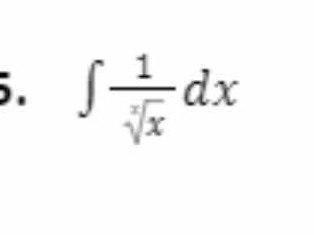Evaluate the integral ∫ 1/(x√x) dx.

Understand the Problem
The question is asking us to evaluate the integral of the function 1/(x√x) with respect to x. This requires knowledge of integration techniques, potentially involving substitution or recognizing it as a standard form.
Answer
The integral evaluates to: $$ -\frac{2}{\sqrt{x}} + C $$
Answer for screen readers
The integral evaluates to: $$ -\frac{2}{\sqrt{x}} + C $$
Steps to Solve
-
Rewrite the Integral The integral can be rewritten for easier integration: $$ \int \frac{1}{x \sqrt{x}} , dx = \int \frac{1}{x^{3/2}} , dx $$
-
Apply the Power Rule Using the power rule for integration, which states that $$ \int x^n , dx = \frac{x^{n+1}}{n+1} + C $$ for ( n \neq -1 ), we can integrate: Here, ( n = -\frac{3}{2} ).
-
Integrate the Function Calculate the integral: $$ \int x^{-3/2} , dx = \frac{x^{-3/2 + 1}}{-3/2 + 1} + C = \frac{x^{-1/2}}{-1/2} + C $$ This simplifies to: $$ -2x^{-1/2} + C $$
-
Rewrite the Answer Finally, rewrite it using radical notation: $$ -2\frac{1}{\sqrt{x}} + C = -\frac{2}{\sqrt{x}} + C $$
The integral evaluates to: $$ -\frac{2}{\sqrt{x}} + C $$
More Information
This integral is a common form in calculus that illustrates the power rule for integration. The result shows how integral calculus can simplify expressions involving roots and fractions.
Tips
- Confusing the power rule: Make sure to adjust the exponent correctly when integrating.
- Forgetting to add the constant (C) for the indefinite integral.
AI-generated content may contain errors. Please verify critical information